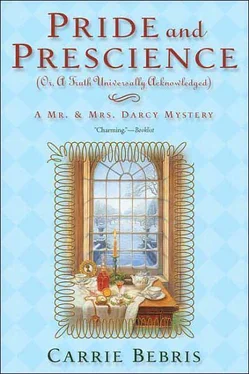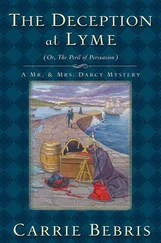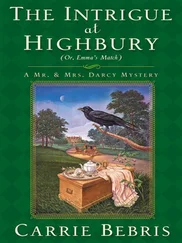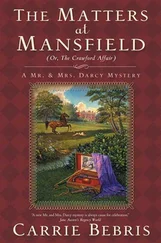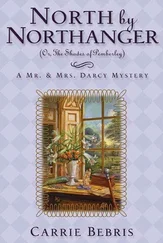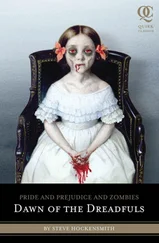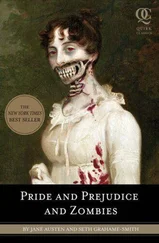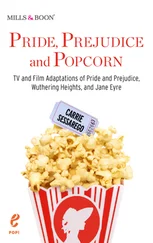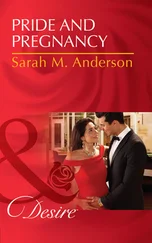Randolph, meanwhile, seized Caroline’s pistol and extricated Mrs. Parrish from Elizabeth’s chair. Blinking, Caroline observed the scene groggily, like someone awakening from a long sleep. She glanced, expressionless, from Elizabeth to Darcy to Randolph. Her countenance turned icy when her gaze lit upon Parrish.
“Charles,” she said wearily as she caught sight of her brother, “I don’t feel at all well.”
Elizabeth at last found her voice. “Professor Randolph, will Mrs. Parrish recover from her ordeal?”
“In good time,” Randolph said. “But first, there is something else I must do.”
“Caroline is incapable of wilfully deceiving any one; and all that I can hope in this case, is that she is deceived herself.”
Jane to Elizabeth, Pride and Prejudice,
Chapter 21
Randolph still held the oaken rod he’d carried into the chamber; Elizabeth now recognized it from the London museum exhibit. Though she and Darcy had viewed the display of mysterious articles only a few weeks earlier, that day now seemed half a lifetime ago.
Taking Caroline’s left hand, the supernaturalist touched the rod to her ring and uttered a command. The gem glowed momentarily, then dulled. “There,” he said. “The bond is broken.” He slid the ring from her finger and asked Darcy for Parrish’s companion ring. Darcy hesitated, regarding him warily, but surrendered it.
Randolph withdrew two small silver candles from his pockets. As the assembly watched in disbelieving silence, he placed them before the fire and lit them. “Ah-bro-GAH-tay.” He slipped Caroline’s ring over the wick of one candle. “Abrogate.” He dropped Parrish’s ring over the wick of the other. “ Abrogate. As I will, so mote it be.”
He extracted a small leather pouch from one of his breast pockets, and a thin silver stylus from the other. The stylus he used to lift the rings off the candles and place them into the pouch. He then extinguished the candles with his thumb and index finger. “These rings will never again be used for ill purposes.”
“Where did they come from?” Elizabeth asked.
“Most recently, a pawnbroker’s shop in New Orleans.” Randolph tucked the pouch into his breast pocket. “You’d be surprised at the objects that find their way into such establishments. I spotted this pair and, based on appearance and the inscription, suspected they were a legendary set known as the Halbert Rings — the gift of a sixteenth-century French nobleman to his bride. It is said that the marquis loved his wife but was a jealous man, and feared being cuckolded as had so many of his peers. So he commissioned a pair of rings and had them enchanted by the village wisewoman to ensure his wife’s fidelity. But the wisewoman dabbled with forces she did not fully understand and inadvertently invested the rings with the ability to bind one wearer to the other’s will.”
Darcy’s face drew into a frown of suspicion. “If you were the one who found the rings, how did Parrish come to possess them?”
“I didn’t have the money to buy them. I had just been dismissed from my most recent academic post and was seeking a new position. I had been keeping my eye on the rings for about a month when I encountered Mr. Parrish one day in the pawnbroker’s shop. He noted my interest in the rings. I, taking him to be a gentleman of means, explained my professional curiosity about them in hopes that he might be prevailed upon to patronize my studies.”
Randolph cast one of the candles into the hearth. The wax quickly softened and caught fire, brightening the dim room. “Mr. Parrish agreed to purchase the rings and keep them for me until I had the wherewithal to pay for them myself. He said, however, that he was leaving the country the next day and did not expect to return for some time. To my surprise and delight, he invited me to accompany him to England. He said he was intrigued by my studies and wanted to learn more about them. Perhaps, he suggested, he might consider financing my next expedition, or could introduce me to others who would.
“I could scarcely believe my good fortune! Indeed, I was so excited I didn’t realize until later that I hadn’t even learned the name of my new benefactor. Having no other prospects or connections, I packed my belongings and met him at the docks the next morning. It was then that he introduced himself to me as Frederick Parrish, owner of a sugar plantation.”
The first candle having liquefied, he tossed the other into the blaze. It, too, was quickly consumed. “During the voyage, Mr. Parrish displayed insatiable curiosity about the rings — their history, what they did, how they worked. His enquiries then expanded to encompass other artifacts and enchantments. He proved a quick student, absorbing even the tiniest details. After so many years of having my work mocked and unappreciated, I was gratified by his abundant interest. I never realized that I was unwittingly helping him develop a most despicable plot.”
“Would it have made a difference, Randolph?” Parrish snickered. “When we met, you didn’t have a pot to piss in. You were at that pawnbroker’s shop to sell one of your other pieces of junk just to pay your rent.”
“That’s true — I was,” he told the Darcys. “Perhaps I didn’t realize what was happening because I didn’t want to. Once we reached London, Parrish established himself in the townhouse while I took a small room in Fleet Street. Concerned about the safety of my artifacts, I arranged for them to be displayed at the British Museum rather than store them in my room or accept Mr. Parrish’s offer to keep them at the townhouse. He seemed quite put out by my decision, to the point where I feared losing his patronage.
“Mr. Parrish soon became the toast of the ton, and I benefited from his popularity. While he courted marriageable young ladies, I courted potential patrons. And so when he came to me with a lock of Miss Kendall’s hair and asked me to teach him how to create a charm I’d told him about, to my shame, I complied rather than risk losing his favor.”
Elizabeth recalled Parrish asking for a lock of her own hair. “What did the charm do?”
“If the lock is freely given, the charm blinds the giver to the wearer’s faults,” Randolph said. “It’s not as powerful as the rings; it doesn’t dominate another’s will, merely discourages one from considering the wearer’s statements and actions too critically. I believe Mr. Parrish fashioned a second charm — the medallion your husband just removed — from locks given by members of this household.”
That explained the lack of resistance Parrish had encountered when he suggested institutionalizing Caroline, Elizabeth realized. He must have invoked the medallion that night, as he had with Bingley just now.
At Randolph’s invitation, Darcy, still holding the medallion, cast it into the flames. The unpleasant odor of burning hair wafted through the room, but all were too interested in learning more from Randolph to leave.
“Did you not wonder why Parrish wanted to create such an item?” Darcy asked.
“I thought he only wanted to aid his suit and secure Miss Kendall’s hand more quickly. By then, I had started to suspect that his financial resources were running low — he hosted fewer parties, spent more conservatively. He still talked about financing my expedition but never advanced any capital. I believed him simply strapped until the sale of his plantation was complete. Selfishly, I thought his marrying an heiress might restore his generosity, and I yet hoped some of it would fall my way.”
Darcy squeezed Elizabeth’s hand, then released her to approach Parrish. “When Mr. Kendall investigated you and ended the courtship, you had to find another heiress. And you had to act quickly, before Kendall exposed you to all of society.”
Читать дальше
